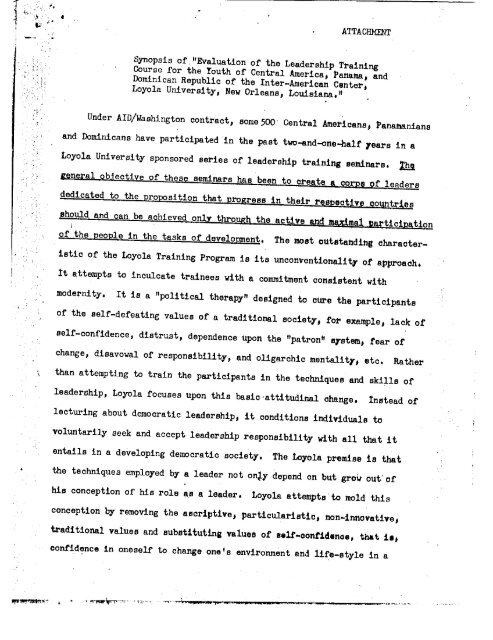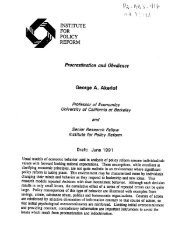'------_......-----_ ..• -_ ... -.
'------_......-----_ ..• -_ ... -.
'------_......-----_ ..• -_ ... -.
You also want an ePaper? Increase the reach of your titles
YUMPU automatically turns print PDFs into web optimized ePapers that Google loves.
ATTACHMENT<br />
, . f'<br />
Synopsis of. "Evaluation of the Leadership Training<br />
Course for the Youth of Central America, Panama, and<br />
Dominican Republic of the Inter-American Center,<br />
Loyola University, New Orleans, Louisiana."<br />
Under AID/Washington contract, sorue500' Central Amerioans, Panamanians<br />
and Dominicans have participated 'in the past two-and-one-half Tears in a<br />
Loyola University sponsored series of leadership training seminars. lh!<br />
. i general objective of these seminars hae been to oreate a corps pf leaders<br />
dedicated to the proposition that progresB in their respeotive goyntries<br />
phould and can be achieved only through the active and max!mal ParticiPation<br />
I·<br />
of thp people in the tasks of deyelopmsnt. The most outstanding charaoteristic<br />
of the Loyola Training Program is its unconventionality of approach.<br />
It attempts to inculcate trainees with a commitment consistent with<br />
modernity. It is a "political therapy" designed to oure the participants<br />
of the self-defeating values of a traditional society, for example, lack of<br />
self-confidence, distrust, dependence upon the "patron" system, fear of<br />
change, disavowal of responsibility, and oligarchic mentality, etc. Rather<br />
\ than attempting to train the participants in the techniques and skills of<br />
leadership, Loyola focuses upon this basic'attitudinal change. Instead of<br />
lecturing about democratic leadership, it conditions individuals to<br />
voluntarily seek and accept leadership responsibility with all that it<br />
entails in a developing democratic society. The Loyola premise i9 that<br />
the techniques employed by a leader not o~y depend on but grow out· of<br />
his conception of his role as a leader. Loyola attempts' to mold this<br />
conception qy removing the ascriptive, particularistic, non-innovative,<br />
traditional values and subst1tuting values of self-oonf1dlnce, that 11,<br />
oonfidence in oneself to change one's environment and tife-style in a<br />
'------_......-----_ ..<strong>•</strong> -_ ... -.<br />
..,..,... ... $ I '1*'" <strong>•</strong><strong>•</strong> «h .. ;:04
~'<br />
- 2 -<br />
progressive fashion. Loyola is a "how to be," not a "how to do it"<br />
course.<br />
I<br />
During the ~ix weeks, Loyola proceeds by involving the participants<br />
in an expedition of self-discoveryJ it challenges them intellectua11y<br />
and emotionally to assert themselves and find their own solutions.<br />
In this process, it builds self-cimfidence in the participants--<br />
a Bine qua non of qualities for all change agents in order that they become<br />
innovating and resolute entrepreneurs of political development.<br />
peecription<br />
,<br />
f~'; '"'/.,. The Inter-American Center (IAC), a division of the Institute of<br />
~i' ,t'<br />
f A Hwnan Relations of Loyola; University, New Orleans, began its training of<br />
Central American, Panamanian, and Dominican p3rticipante in October, 1964.<br />
Since that time, 18 six-week seminars fo"' 500 participants have been<br />
conducted.<br />
The training is conducted and supervised h7 the Btaff of the<br />
lAC, by 25·30 professors and experts from five kew Orleans based universities<br />
and governmental and private agencies, and qualified personnel from the<br />
kaHonal Training Laboratories (a divi~ion<br />
of the kational Education<br />
, \ Associ&tion which provides the serviced of Puerto ~ican trainers to Loyola<br />
<strong>•</strong><br />
through a subcontract.)<br />
The course is comprised of three distinct portions. The academic<br />
part provides the substsntive instruction through lectures, seminars, and<br />
group discussion.<br />
It involves the participants in problem solving and<br />
decision-making in the framework of insti~utional<br />
change, increasing their<br />
capacity to analyze and evaluate ideologies, political problems and<br />
development trends. The instruction stresses the value of the participative<br />
, "<br />
\'-' .. :'!'<br />
leader in the modernization process and emphasizes the role of institutions<br />
I<br />
.' .'-'<br />
4' '; 'I<br />
f'" ... ~. <strong>•</strong><strong>•</strong> ;J \ T .~.- -- ,.",..--- .8 . 4 .,<br />
--<br />
+ \¥iij4
-, ,<br />
- 3 <strong>•</strong><br />
, . ,<br />
and ;group ccnssnsus in the decision-making process.<br />
The second part of<br />
the program is the NTL training in sensitivitr and group dtnamics.<br />
participants study human relations and group interaction in order to develop<br />
skills for identifying and manipulating the forces of change and also to<br />
improve their individual and collective awarenees of their own abilities.<br />
Ths third aspect of the training program oonsists of 5 dars of field trips,<br />
The<br />
'
,,";"<br />
- 4 -<br />
of its objective--it is an attempt to channel the participants' attitudes<br />
toward the environment in a manner consistent with progress through the<br />
popular participation of the people.<br />
Certain operation problems in. the field<br />
Several problems exist which limit the usefulness of the Loyola program.<br />
For example, Loyola complies with Title IX in its design, but only condItionally<br />
in its actual performance.<br />
In its design, the Loyola projects concentrates<br />
\<br />
:! ;.<br />
upon upgrading the quality of human resources u.r focusing on leadership,<br />
not on leadership training for its own sake, but on leadership development<br />
for eliciting popular participation. That is, it is a bona fide training<br />
for the type of development Title 1X envisions. However. the lack of<br />
integration of the Loyola project, itself. with the programs at the mission<br />
level has been! up to now. its greatest weaknes~.<br />
Of all the missions<br />
visited or which have responded to date to the Title IX inquiry, only<br />
trSAID Guatemala has fully integrated the Loyola training with one of its<br />
i, '<br />
priority programs, rural development.<br />
It is not that there is D2 AID-connected<br />
follow-up work on the part of the retu;nees, but rather that the follow-up<br />
work is coincidental} it is an I ad hQ9. integratioll, not the result of<br />
., ,<br />
deliberate choice.<br />
This lack of integration is due to several factors, one<br />
of which is the defective administration in the selection of the trainees.<br />
In three of the four countries visited, the Loyola program is the responsi-<br />
,<br />
bilityof the training' officers, who are not familiar with the political<br />
development design and content of the Loyola course. Further, the. training<br />
officers select the trainees on the basis of personal qUalifications alone<br />
without considering the particular program needs of USAID.<br />
Since the<br />
<strong>•</strong><br />
.........___...--______ _. ..........-..<br />
~_<br />
---o~o
.'· .<br />
- --------c----------------------___ _<br />
- 5 - .<br />
selection is not done in view of such considerations, it is left to<br />
chance whether there will or will not be a follow-up.<br />
In regard to the<br />
problem of using the ex-participants to serve USAID needs, a Loyola<br />
follow-up program does exist primarily because of the lack of built-in<br />
follow-up programs in USAID.<br />
This program financed by American business<br />
interests (United Fruit Company, Standard Fruit Company, etc.) provides<br />
a "minigrant" to service the immediate and justified needs of the<br />
ex-participants.<br />
I·<br />
, .<br />
,<br />
, I"<br />
<strong>•</strong>
















